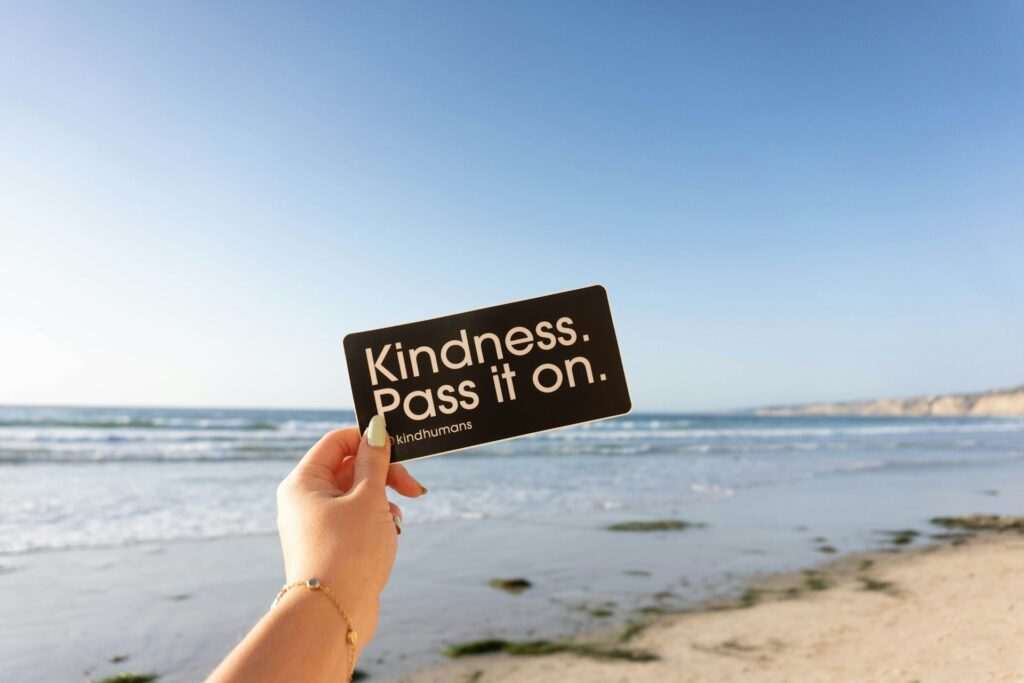
Photo by Mei-Ling Mirow on Unsplash
You know those moments when your mind turns into a jerk? It’s like it’s got a VIP pass to your insecurity vault and starts throwing your flaws and mess-ups in your face. We’ve all been there, mate.
But listen up – cutting yourself some slack isn’t just feel-good nonsense. It’s actually a power move when you’re in a slump.Think about it. Would you let a friend talk to themselves the way you do? Probably not. So why give your inner critic a free pass? It’s time to tell that voice to pipe down and start being your own cheerleader.
Being kind to yourself when you’re down isn’t weak – it’s smart. It’s like giving yourself a mental high-five instead of a face-palm. And trust me, it can flip your mood faster than you’d think.
Why We’re So Hard on Ourselves
First up, let’s talk about why we’re often so rubbish at being kind to ourselves. It’s like we’ve got this inner drill sergeant who thinks tough love is the only way forward. But guess what? That approach often backfires.
Common self-critical thoughts:
- “I’m not good enough”
- “I always mess things up”
- “Everyone else has it together except me”
Sound familiar? These thoughts aren’t just unpleasant – they can actually keep you stuck in a low mood.
The Power of Self-Compassion
Now, I’m not saying you should start giving yourself participation trophies for getting out of bed. But there’s a middle ground between harsh self-criticism and delusional self-praise. It’s called self-compassion, and it’s like a secret weapon for dealing with tough times.
Benefits of being nice to yourself:
- Reduces symptoms of anxiety and depression
- Boosts resilience
- Improves overall well-being
- Helps you bounce back from setbacks faster
How to Be Your Own Best Mate
Alright, let’s get practical. Here are some ways to show yourself some love when you’re feeling low:
- Talk to yourself like you’d talk to a friend: Would you tell your mate they’re a failure for having a bad day? Didn’t think so. So don’t say it to yourself.
- Acknowledge the suck: It’s okay to admit when things are tough. You don’t have to pretend everything’s fine.
- Practice self-compassion breaks: Take a moment to breathe and say something kind to yourself. It might feel weird at first, but it gets easier.
- Write yourself a kind letter: Seriously, grab a pen and write to yourself like you’re writing to someone you care about.
- Do something nice for yourself: Treat yourself to your favourite coffee, take a relaxing bath, or watch that show you love. Small acts of kindness matter.
Real Talk: My Journey with Self-Compassion
I’ll level with you – I used to be brutal with myself. If I made a mistake, I’d beat myself up for days. But that approach? It sucked. Big time.
Learning to be kinder to myself was a game-changer. Now, when I’m feeling low, I try to treat myself like I would a good friend. It doesn’t magically fix everything, but it makes the tough times a whole lot more manageable.
Building Your Self-Compassion Muscles
Like any skill, being nice to yourself takes practice. Here are some ways to build up your self-compassion:
Daily habits:
- Start your day with a kind message to yourself
- Keep a gratitude journal
- Practice mindfulness meditation
During tough times:
- Ask yourself, “What would I say to a friend in this situation?”
- Challenge your negative self-talk
- Remind yourself that everyone struggles sometimes
Remember, it’s not about being perfect. It’s about being a bit kinder to yourself, bit by bit, day by day.
FAQs: Your Burning Questions About Self-Compassion
Q: Isn’t self-compassion just making excuses for myself?
A: Nope. It’s about understanding and supporting yourself, not letting yourself off the hook.
Q: Can being nice to myself really help with low mood?
A: Absolutely. Research shows self-compassion can reduce symptoms of depression and anxiety.
Q: What if I’m not used to being kind to myself?
A: Start small. Even tiny acts of self-kindness can make a difference over time.
Q: Can self-compassion replace other treatments for depression?
A: It’s a great tool, but it’s not a replacement for professional help if you need it. It works best as part of a broader strategy.
The Science Behind Self-Compassion
Now, I’m not going to bore you with a bunch of scientific jargon, but there’s some pretty cool research backing up the power of self-compassion. Studies show that people who are kinder to themselves have lower levels of cortisol (the stress hormone) and higher levels of oxytocin (the feel-good hormone).
What does this mean for you? Basically, being nice to yourself can help calm your body’s stress response and make you feel better both mentally and physically.
Overcoming Obstacles to Self-Compassion
Let’s be real – being kind to yourself isn’t always easy. You might feel like you don’t deserve it, or that being hard on yourself is the only way to improve. But here’s the truth: self-compassion isn’t about letting yourself off the hook. It’s about creating a supportive internal environment that actually helps you grow and overcome challenges.
Common obstacles to self-compassion:
- Feeling like you don’t deserve kindness
- Worrying that you’ll become lazy or complacent
- Believing that self-criticism is motivating
If you’re struggling with these thoughts, remember: self-compassion is about treating yourself with the same kindness you’d offer a good friend. It’s not about making excuses – it’s about creating a supportive foundation for growth and healing.
The Bottom Line: You Deserve Kindness, Especially from Yourself
Look, feeling low sucks. There’s no way around that. But beating yourself up about it? That sucks even more. Being kind to yourself isn’t a magic cure for low mood, but it can make a real difference in how you experience and recover from tough times.
Remember, you wouldn’t lay into a friend for having a bad day, so try to extend that same kindness to yourself. It might feel weird at first, but stick with it. You’re worth the effort.
So next time you’re feeling down, try to be your own best mate. Speak to yourself with kindness, acknowledge that it’s tough, and remind yourself that you’re doing your best. Because at the end of the day, a little self-compassion can go a long way in lifting you up when you’re feeling low.
And hey, if you’re reading this while in the middle of a rough patch, take a deep breath. You’re doing great just by seeking out ways to help yourself. That takes courage, and you should be proud of that. Be nice to yourself – it really does help when you’re feeling low.








